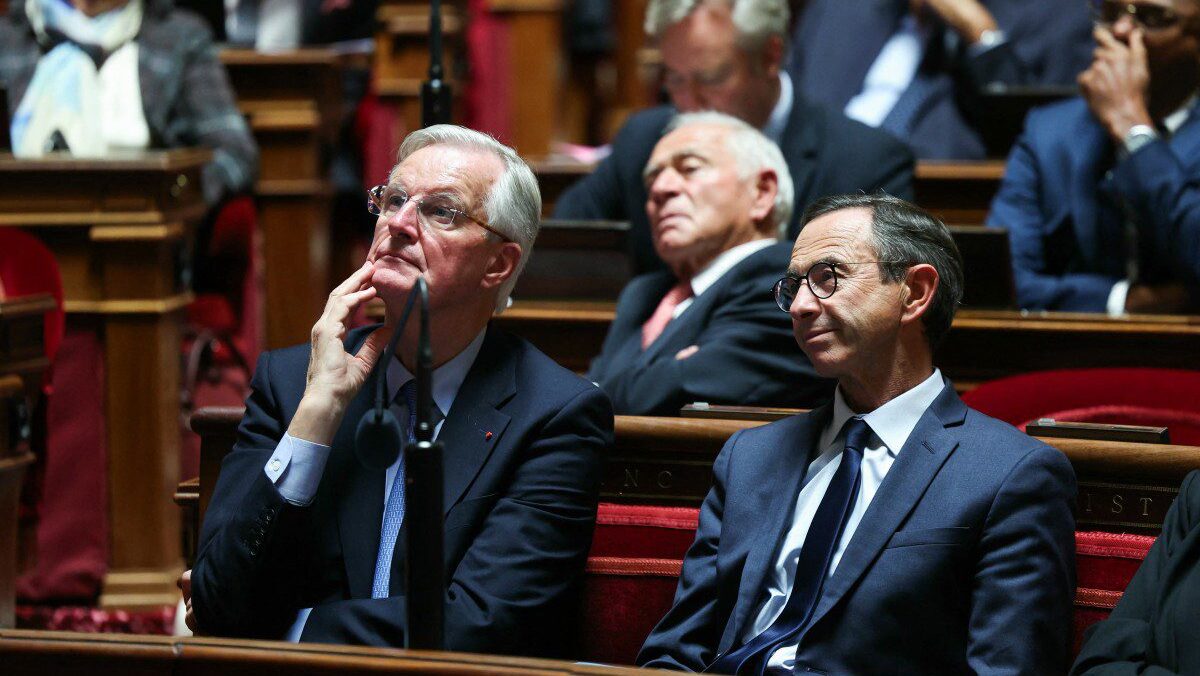
French Prime Minister Michel Barnier (L) looks on next to French Minister of the Interior Bruno Retailleau after delivering a speech to the French Senate in Paris, on October 2, 2024, the day after presenting his general policy statement to the French National Assembly.
Photo: Thomas SAMSON / AFP
Deaf to the cries of outrage from the Left, who have been denouncing his ideological closeness to the Rassemblement National since his televised appearance on Sunday, France’s new Interior Minister Bruno Retailleau is persisting with his statements on the need to control illegal immigration and reduce legal immigration. In an interview with Figaro Magazine, he unveils the broad outlines of his plan to combat immigration, crime, and political Islam.
In the interview, the minister takes another look at the numerous “malfunctions” that led to the murder of 19-year-old Philippine on Friday, September 20th. To avoid a repeat of the same scenario in the future, Retailleau advocates tougher detention rules for illegal immigrants facing deportation.
He denounces—for the first time at such a high level of government—the harmful role played by the associations that intervene in detention centres to provide legal and social advice to immigrants sent there. They are both “judge and party,” according to the minister, who would like to see the work they do be handed over to a government agency, the Office français de l’immigration et de l’intégration (French Office for Immigration and Integration). He also reveals the exorbitant amount of subsidies allocated to these associations: “One billion euros for all the associations responsible for welcoming and assisting migrants.”
The tragedy of Philippine’s death also calls for a reassessment of the management of illegal minors. The suspect was 17 when he arrived on French soil and was first convicted of rape. “Her presumed murderer was sentenced to just seven years’ imprisonment for rape, with the excuse of minority. For an adult, that would have been double. We undoubtedly need to reverse the logic and make the excuse of minority the exception, justified by the judge, rather than the rule,” points out the minister, who hopes that a law will make it possible to change the situation.
Retailleau gives details of an entire, little-known area of immigration control policy that is due to undergo major changes: the issue of visas and consular laissez-passers. The minister points out that France has considerable leverage in gaining the respect of migrants’ countries of origin, which it hardly uses at all: the granting of visas. Here again, he gives figures that are little known to the public. In the case of Morocco, in 2023, 238,750 visas were granted to Moroccan citizens. In exchange, the French government obtained only 725 laissez-passers and only 865 forced departures. In the same year, Algeria obtained 205,853 visas but took back only 2,191 of its nationals, 1,680 of whom were forcibly removed. The disproportion is flagrant and calls for a reaction.
The interviewing journalist points out that the previous minister, Gérald Darmanin, already tried to reverse the trend, without success. Bruno Retailleau suggests that the political will was not really there, and that it is now important for the French government to raise the tone by also using another means of pressure: cooperation and development aid.
He adds that no serious policy can be pursued without a European perspective. On the economic question, Retailleau mentions the negotiations underway in Brussels on a trade preference mechanism, in other words, customs duties: “this is an historic opportunity to demand reciprocity in areas that are important to Europeans,” he explains. He also plans to call, again at the European level, for reform of the Return Directive, which he accuses of currently making it virtually impossible to return illegal immigrants.
The question that arises with regard to these avenues of work is of course their political implementation, which in the current fragile political balance in France makes them more than uncertain. First of all, Retailleau points out that there is considerable room for manoeuvre when it comes to the effective application of existing legislation: “All too often, the administration does not go as far as the law allows,” he notes.
Then, of course, it will be necessary to pass new laws. Retailleau interprets the results of the July 2024 elections as a mandate for greater security and control of immigration—proof that he is incorporating into his thinking, without saying so, the importance of the vote for the Rassemblement National with its 11 million voters: “I was appointed to respond to a majority aspiration of the French: to restore order, in terms of security as well as immigration,” he asserts. Even if he remains vague, he says he is confident of his ability to obtain a consensus among MPs in favour of a firmer stance.
Unfortunately, in the arena of the National Assembly, things are likely to be considerably more complicated once the debate comes. What’s more, as RN MP Laure Lavalette was eager to denounce, this is unfortunately not the first time that a member of the Les Républicains party has shown such apparent firmness without subsequently bothering to make his vote consistent with his statements. ”LR often talk like us during campaigns and then govern like macronists”, she recalled in an interview for Frontières.
